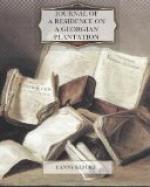I saw an advertisement this morning in the paper, which occasioned me much thought. Mr. J—— C—— and a Mr. N——, two planters of this neighbourhood, have contracted to dig a canal, called the Brunswick canal, and not having hands enough for the work, advertise at the same time for negroes on hires and for Irish labourers. Now the Irishmen are to have twenty dollars a month wages, and to be ‘found’ (to use the technical phrase,) which finding means abundant food, and the best accommodations which can be procured for them. The negroes are hired from their masters, who will be paid of course as high a price as they can obtain for them—probably a very high one, as the demand for them is urgent—they, in the meantime, receiving no wages, and nothing more than the miserable negro fare of rice and corn grits. Of course the Irishmen and these slaves are not allowed to work together, but are kept at separate stations on the canal. This is every way politic, for the low Irish seem to have the same sort of hatred of negroes which sects, differing but little in their tenets, have for each other. The fact is, that a condition in their own country nearly similar, has made the poor Irish almost as degraded a class of beings as the negroes are here, and their insolence towards them, and hatred of them, are precisely in proportion to the resemblance between them. This hiring out of negroes is a horrid aggravation of the miseries of their condition, for, if on the plantations, and under the masters to whom they belong, their labour is severe, and their food inadequate, think what it must be when they are hired out for a stipulated sum to a temporary employer, who has not even the interest which it is pretended an owner may feel in the welfare of his slaves, but whose chief aim it must necessarily be to get as much out of them, and expend as little on them, as possible. Ponder this new form of iniquity, and believe me ever your most sincerely attached.
* * * * *
Dearest E——. After finishing my last letter to you, I went out into the clear starlight to breathe the delicious mildness of the air, and was surprised to hear rising from one of the houses of the settlement a hymn sung apparently by a number of voices. The next morning I enquired the meaning of this, and was informed that those negroes on the plantation who were members of the Church, were holding a prayer-meeting. There is an immensely strong devotional feeling among these poor people. The worst of it is, that it is zeal without understanding, and profits them but little; yet light is light, even that poor portion that may stream through a key-hole, and I welcome this most ignorant profession of religion in Mr. ——’s dependents, as the herald of better and brighter things for them. Some of the planters are entirely inimical to any such proceedings, and neither allow their negroes to attend worship, or to congregate together for religious purposes,




